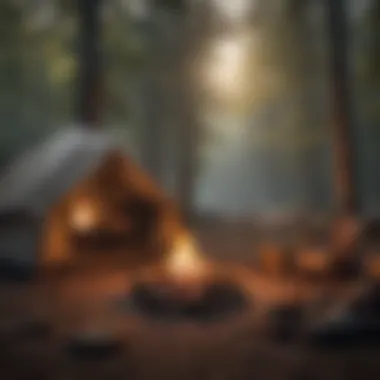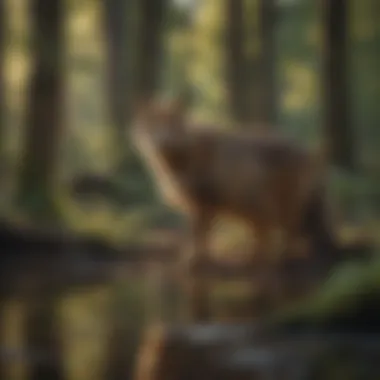Tent Camping in Tennessee: A Comprehensive Guide


Intro
Tent camping in Tennessee offers a unique blend of natural beauty and adventure. As a state rich in diverse landscapes, Tennessee provides various sites that cater to both novice and seasoned campers. From the rolling hills of the Great Smoky Mountains to the serene lakes of the Tennessee Valley, each location showcases the state's natural charm.
Understanding the environment and how humanity interacts with it is fundamental for a fulfilling camping experience. The forests of Tennessee have been shaped by both natural forces and human practices, and recognizing these influences can deepen one's appreciation for the wilderness. This guide aims to illuminate the best camping areas throughout Tennessee, highlighting accessibility, available amenities, and the natural attributes that define each spot. Furthermore, practical tips for effective tent camping will help campers optimize their experiences in the great outdoors.
By the end of this guide, readers will not only identify prime camping locations but also appreciate the ecological significance and stewardship involved in maintaining these natural spaces.
Understanding Forestry Practices
Types of Forestry Practices
Forestry practices in Tennessee can broadly be classified into several types, each serving distinct purposes. Sustainable forestry emphasizes methods that maintain the health of forest ecosystems. Practices like selective logging and reforestation are essential for preserving biodiversity and ensuring natural resources for future generations.
Conversely, industrial forestry focuses on maximizing timber production. This approach often involves clear-cutting and may lead to habitat loss if not regulated effectively. Recognizing these practices can influence camping choices, as certain methods impact the landscape and wildlife.
Historical Context
The history of forestry in Tennessee reveals a complex interplay between conservation and industry. Early settlements relied heavily on natural timber for construction and fuel, leading to widespread deforestation. In response, state initiatives and advocacy for conservation began in the 20th century, highlighting the need to protect the remaining forested areas. Understanding this background contextualizes today’s camping conditions, illustrating why certain locations thrive while others may struggle.
Principles of Woodland Stewardship
Conservation Techniques
Responsible camping in Tennessee involves embracing woodland stewardship. Techniques such as Leave No Trace principles emphasize the importance of minimizing human impact on nature. Campers are encouraged to stay on established trails, dispose of waste properly, and respect wildlife habitats. These practices ensure that the beauty of Tennessee’s woods is preserved for future visitors.
Managing Forest Resources
Effective management of forest resources is vital for maintaining ecosystem health. This includes monitoring vegetation growth, controlling invasive species, and ensuring sustainable harvesting practices. Campers can play a role in this stewardship by observing and reporting environmental changes, which contributes to the ongoing care of the forests they enjoy.
Sustainable Forest Management
Certification Standards
Sustainable forest management in Tennessee is guided by various certification standards, including those set by the Forest Stewardship Council (FSC). These standards ensure that forest management practices are environmentally appropriate, socially beneficial, and economically viable. By choosing campsites in certified areas, campers support responsible practices that safeguard nature.
Economic Benefits of Sustainability
Sustainable practices not only protect the environment but also benefit the local economy. Healthy forests attract tourism, provide resources for local crafts, and enhance recreational opportunities such as tent camping. By understanding the economic implications of sustainability, campers can make informed decisions that contribute positively to the communities they visit.
"In Tennessee, camping intertwines with sustainable forestry, creating a unique opportunity for education and appreciation of our natural resources."
Preface to Tent Camping in Tennessee
Tent camping in Tennessee is a profound way to immerse oneself in the state’s rich natural offerings. It combines the enjoyment of the great outdoors with the simplicity of sleeping under the stars. This experience becomes essential for those looking to escape the hustle of daily life while absorbing the tranquility of nature.
Tennessee’s diverse landscapes provide a stunning backdrop for camping. From the rugged Great Smoky Mountains to the serene lakes and rolling hills, each area has unique characteristics that cater to different preferences. Understanding these elements is important for selecting the right camping location.
The benefits of tent camping extend beyond merely experiencing nature. It fosters a deeper connection with the environment, encouraging mindfulness and appreciation for the outdoors. Camping also serves as a platform for social connections, whether with family, friends, or fellow campers. It offers an opportunity for educational experiences regarding local wildlife, ecosystems, and even survival skills.
Furthermore, engaging in tent camping can contribute significantly to personal health and well-being. Activities like hiking, fishing, or simply exploring the landscapes provide not just physical exercise but also mental relaxation. It's clear that tent camping in Tennessee provides much more than just a place to rest at night; it becomes a journey into nature’s heart.
Overview of Tennessee’s Natural Landscape
Tennessee's natural landscape is remarkably varied and encompasses different ecosystems. The state is divided into three main regions: the Appalachian mountains in the east, the Cumberland Plateau in the middle, and the cotton-rich plains in the west. Each region showcases distinctive terrains, flora, and fauna.
In the eastern part, the Great Smoky Mountains stand out with their lush greenery, rich biodiversity, and numerous trails. This area is known for its fog-covered peaks and vibrant foliage during fall. The Cumberland Plateau features rugged cliffs and deep valleys, making it perfect for more secluded tent camping experiences. Lastly, the western part, with areas like Reelfoot Lake, offers flat landscapes and diverse aquatic ecosystems.


Such diversity enhances the camping experience by allowing individuals to select an environment that suits their comfort and adventure level. Weather conditions also vary significantly, making it essential to plan carefully according to the season and region.
Benefits of Tent Camping
Tent camping provides a variety of benefits that appeal to different kinds of campers. One major advantage is the ability to disconnect from technology and engage with nature directly. This disconnection can have restorative effects on mental health, helping individuals feel rejuvenated.
Spending time outdoors can also facilitate increased physical activity. While camping, one can engage in hiking, biking, or swimming, offering both fitness and fun. These activities cultivate a sense of adventure and well-being.
Additionally, tent camping often does not require significant financial investment compared to other forms of accommodation such as cabins or hotels. This aspect makes it accessible to a wider audience, encouraging more individuals to experience the beauty of Tennessee’s outdoor spaces.
Essential Considerations Before Camping
Tent camping in Tennessee can be a rewarding outdoor adventure, but also requires careful planning. Before embarking on your journey, understanding essential considerations will enhance your experience. Each aspect, from permits to gear, plays a vital role in ensuring a safe and enjoyable trip.
Permits and Regulations
In Tennessee, various camping locations may have specific permits and regulatory requirements. Many state parks and national recreation areas require a designated camping permit. This ensures that campers contribute to conservation efforts and adhere to specific park rules. It’s crucial to research the camping rules for the park or area you plan to visit.
For instance, Great Smoky Mountains National Park has its own set of regulations for camping, including campsite selections and fire restrictions. Understanding these permits is key. Failure to comply can result in fines or being asked to leave the park. Check the Tennessee State Parks website or the specific park's page for the most current information.
Safety Precautions
Safety is paramount when camping. Tennessee’s diverse landscape poses different hazards for campers. From wildlife to inclement weather, preparation can mitigate potential risks. A good practice is to inform someone about your trip schedule and where you will be camping. This precaution can be invaluable in case of emergencies.
Additionally, be aware of wildlife in the area. Encounters with bears and snakes, although rare, can happen. Storing food properly away from your tent and understanding local wildlife behaviors are essential steps. It is advisable to carry a first-aid kit and know basic first-aid techniques. Even simple precautions, such as using insect repellent, can prevent discomfort and health issues.
Choosing the Right Gear
Selecting appropriate camping gear can significantly affect your overall experience. Not all camping gear is created equal, and the right choices play a role in comfort and safety. Start with a quality tent that suits the climate and conditions of your selected location. A tent should be durable yet lightweight for easy transportation. Consider three-season tents for versatility across various weather conditions.
Besides the tent, sleeping systems are equally important. Sleeping bags designed for the temperatures you expect to encounter will enhance sleep quality. Also, don’t forget other essentials like cooking gear, water filtration systems, and appropriate clothing.
In sum, investing time in selecting suitable gear is fundamental for tent camping success.
"Planning and preparation are keys to a memorable camping experience."
Prioritize long-lasting and functional items to ensure your camping experience in Tennessee is enjoyable and safe.
Top Tent Camping Locations in Tennessee
Tennessee is a state rich in natural beauty with locations that offer diverse tent camping experiences. The significance of exploring top tent camping spots lies in the variety of environments they provide. From the rugged mountains to serene lakes, each location has unique features that enhance the camping experience. Finding an ideal spot can improve not just comfort but also overall enjoyment of the outdoors. This places great importance on understanding the specific elements that distinguish each location, whether it’s the variety of wildlife, scenic views, or recreational activities available.
Great Smoky Mountains National Park
Overview of Campsites
Great Smoky Mountains National Park features a range of campsites, each offering a distinct atmosphere. These campsites vary from developed sites with amenities to more secluded areas for those seeking solitude. A key characteristic is the availability of designated campgrounds, such as Cades Cove and Elkmont. Many campers choose this area for its accessibility to colorful wildflowers and towering trees. A unique aspect is the proximity to hiking trails, which make it easy for campers to explore the park's rich biodiversity right from their tents.
Accessibility and Amenities
Accessibility plays a crucial role in why Great Smoky Mountains is a popular site for tent camping. With multiple entry points, including the Gatlinburg entrance, reaching the park is straightforward. The campgrounds come equipped with restrooms, water sources, and picnic tables, providing necessary amenities to enhance the camping experience. While these amenities offer comfort, some campers may find the busy nature of certain locations less appealing during peak seasons. Therefore, an early arrival is recommended.
Nearby Attractions
The attractions surrounding the Great Smoky Mountains add significant value to camping there. Visitors can explore nearby sites such as Pigeon Forge and Gatlinburg, which offer entertainment and dining options. Moreover, the park itself has various attractions like Cades Cove Loop Road for wildlife watching and scenic drives. Such nearby activities can be a double-edged sword; they provide entertainment but can detract from the serene camping environment that many seek.
Chattanooga State Park


Park Features and Activities
Chattanooga State Park is known for its extensive recreational opportunities. With features such as hiking trails, fishing areas, and playgrounds, it caters to diverse interests. The park includes a substantial lake, which serves as a hub for fishing and kayaking, making it a favorite among outdoor enthusiasts. Its well-maintained facilities contribute to its popularity; however, during peak times, crowds can limit the sense of accessibility to nature.
Campsite Details
Campsites in Chattanooga State Park are well-spaced, providing some privacy. Most sites come with fire rings and picnic tables, essential for a comfortable camping experience. Another benefit is the park's proximity to the urban area of Chattanooga, providing easy access to supplies. Nonetheless, the closeness to the city may lead some campers to feel less immersed in nature, a potential drawback for those seeking isolation.
Local Wildlife
The local wildlife in Chattanooga State Park enhances the camping experience. Birdwatchers can spot various species, and occasional deer sightings are common. The park management actively promotes wildlife conservation; thus, it helps maintain a balance in the ecosystem. However, campers should be cautious and respectful of the wildlife, ensuring that all proper safety measures are followed, especially when it comes to food storage.
Frozen Head State Park
Unique Camping Experience
Frozen Head State Park offers a distinctive camping experience with its rugged terrain and lush forests. This park is famed for its challenging trails and secluded atmosphere, making it ideal for experienced campers. The park allows for a deeper connection to nature, away from the noise often found in more popular parks. While this seclusion is a major benefit, it may present challenges for those less experienced in wilderness camping.
Trails and Hiking Opportunities
The trails at Frozen Head State Park provide ample opportunities for hiking enthusiasts. With over 50 miles of well-marked trails, visitors can choose routes ranging in difficulty. A significant feature is the chance to hike to the summit of Frozen Head Mountain, which presents breathtaking views. However, the challenging nature of some trails means that proper planning and physical preparedness are essential.
Environmental Considerations
Environmental awareness is paramount in Frozen Head State Park. Campers are encouraged to adhere to Leave No Trace principles to preserve the natural state of the park. The unique habitats in Frozen Head support a variety of flora and fauna, which is a big reason why visitors are asked to respect wildlife and their habitats. Failing to do so can lead to a negative impact on the local ecosystem, highlighting the necessity of education about the environmental responsibilities of campers.
Land Between the Lakes National Recreation Area
Camping Facilities Overview
Land Between the Lakes National Recreation Area offers comprehensive camping facilities. With various campgrounds equipped for different levels of comfort, visitors can choose from primitive sites to those with utilities. Each campground provides opportunities for scenic settings alongside facilities that include fire pits and picnic tables. This versatility makes it an attractive option for diverse camping styles. However, the increased usage during summer might affect the availability of preferred sites.
Recreational Activities Available
Recreational opportunities in Land Between the Lakes are extensive. Visitors can engage in fishing, hiking, and wildlife observation. The park has more than 200 miles of trails and access to water activities. One unique feature is the nearby nature center, which educates visitors about the region's ecology. The downside may be that certain activities can create noise which may detract from the overall tranquility sought by campers.
Conservation Efforts
Conservation efforts are essential in Land Between the Lakes. The park has implemented numerous initiatives to protect its unique environments. This includes restocking fish populations and maintaining wildlife habitats. These efforts ensure that the area remains vibrant for future generations. Nevertheless, the effectiveness of such programs depends on visitor cooperation and adherence to guidelines regarding waste and wildlife interaction.
Fall Creek Falls State Park
Scenic Views and Trails
Fall Creek Falls State Park is known for its striking scenic views. The park features one of the highest waterfalls in the eastern U.S. and a variety of trails that showcase its natural beauty. From panoramic vistas to serene river paths, visitors can immerse themselves in the surroundings. This characteristic makes the park an attractive destination for photographers and nature lovers alike. However, the popularity of certain viewpoints can result in overcrowding.
Campsite Features
Campsites at Fall Creek Falls are well-appointed with amenities to enhance comfort. Features may include water access, electrical hookups, and restroom facilities. Facilities are generally clean and easily accessible. While these conveniences attract more visitors, they may lead to a less rugged camping experience compared to more remote locations.
Visitor Engagement
Visitor engagement is crucial at Fall Creek Falls State Park. The park often hosts educational programs and guided hikes to foster an appreciation for nature. This initiative promotes awareness of local ecosystems. Hands-on experiences can be valuable, especially for families with young children. However, such programs may take away from the quiet exploration some campers prefer.
Camping Etiquette and Best Practices
Camping is an enriching experience, but it comes with responsibilities. Practicing proper camping etiquette is essential for preserving the natural surroundings and ensuring a positive experience for all. By understanding and adhering to these guidelines, campers contribute to the sustainability of their environment and foster a spirit of cooperation among outdoor enthusiasts.


Leave No Trace Principles
The Leave No Trace principles serve as a framework for minimizing human impact on the environment. These seven core guidelines emphasize the importance of planning, respecting the natural surroundings, and maintaining a clean campsite.
- Plan Ahead and Prepare - Good preparation ensures safety and reduces the need to disturb nature.
- Travel and Camp on Durable Surfaces - Stick to established trails and campsites to avoid damaging vegetation and soil.
- Dispose of Waste Properly - Carry out all trash. For human waste, dig a hole at least 6-8 inches deep, or utilize designated restroom facilities.
- Leave What You Find - Preserve the history and beauty of the area by not removing rocks, plants, or historical artifacts.
- Minimize Campfire Impact - Use a camping stove for cooking instead of fire when possible, and if a fire is made, use established fire rings. Keep fires small.
- Respect Wildlife - Observe from a distance. Feeding wildlife can harm them and disrupt natural behaviors.
- Be Considerate of Other Visitors - Maintain noise levels and privacy while sharing common areas. Respect their experience just as you wish them to respect yours.
Following these principles not only protects the environment but also enhances the overall camping experience for everyone involved.
Respecting Wildlife
Respecting wildlife is a crucial component of camping etiquette. Tennessee is home to a diverse range of species, and every camper should recognize their role in preserving this biodiversity. Here are some guidelines to follow:
- Observe from a Distance: Approaching wildlife can provoke stress. Maintain a respectful distance to allow them their space.
- Do Not Feed Animals: Feeding can lead wildlife to rely on human food sources, which is not natural or healthy for them. It can also alter their behavior, making them more aggressive toward humans.
- Secure Food: Use bear-resistant containers or hang food when camping in bear country to prevent attracting animals to your camp.
- Document, Don't Disturb: If you encounter wildlife, take photographs rather than trying to get closer or intervening with their natural behaviors.
By observing animals in their habitats without interference, campers foster an environment where both wildlife and people can co-exist peacefully.
"Treat wildlife as fellow inhabitants, not as objects of entertainment. Your respect can ensure the continuity of their world."
Incorporating these practices into tent camping in Tennessee ensures a conscientious approach to enjoying the outdoors. Through awareness and thoughtful actions, campers can maintain the beauty of Tennessee's landscapes for future generations.
Preparing for Your Tent Camping Trip
Tent camping offers a unique opportunity to immerse oneself in nature. Proper preparation is crucial for having a smooth and enjoyable experience in Tennessee's diverse landscapes. This section emphasizes what one must consider before embarking on a trip. The right planning can prevent potential mishaps and make the camping experience rewarding.
Planning Your Itinerary
Creating an itinerary is an essential aspect of camping preparation. It sets the framework for your trip, ensuring that time is involved wisely and that all desired activities are accounted for. Here are some steps to consider:
- Researching Destinations: Tennessee has numerous state parks and national recreation areas. Research each area to understand what it offers. Great Smoky Mountains National Park, for instance, is known for its variety of flora, whereas Fall Creek Falls boasts the highest waterfall in Tennessee.
- Time Management: Understand how many days you plan to camp. Allocate time for travel and activities. Consider factors like weather and the distance between campsites or attractions. Some camping areas may require longer travel times due to road conditions.
- Daily Activities: List the activities you want to partake in, such as hiking, fishing, or wildlife watching. This helps in creating an engaging yet flexible schedule.
- Backup Plans: Weather can be unpredictable. Keep a list of indoor or alternative activities in case you encounter rain or other adverse conditions.
By preparing a thoughtful itinerary, you can maximize your camping experience, ensuring it is both enjoyable and safe.
Packing Essentials
Packing effectively can make or break a camping trip. It is vital to bring the right items to enhance comfort and functionality. Consider these categories when packing:
- Shelter: Your tent is your base. Ensure it is suitable for the season and offers adequate ventilation and waterproofing. Don’t forget stakes and guylines to secure it properly.
- Sleeping Gear: A sleeping bag rated for the temperature range in Tennessee is important for a restful night. A sleeping pad will also add comfort and insulation from the ground.
- Clothing: Layered clothing is best, considering the varying temperatures throughout the day and night. Breathable fabrics, waterproof jackets, and sturdy footwear are essential.
- Cooking Equipment: A portable stove is convenient for meals. Bring food storage containers, utensils, and a cooler for perishables. If you prefer quick meals, consider easy-to-pack items.
- Safety Equipment: A first aid kit, a map, and a compass are vital. Having a flashlight and extra batteries is also essential for navigating after dark.
- Personal Items: Include personal hygiene products and insect repellent for comfort.
By packing essential items thoughtfully, campers can ensure a comfortable and safe experience in the beautiful terrain of Tennessee.
"A well-prepared camper is often the most successful at enjoying their time outdoors."
Engaging in both planning and packing efficiently not only prepares one for potential unexpected situations but also enhances the overall camping adventure.
Culmination and Further Resources
In the realm of outdoor activities, tent camping in Tennessee stands out for its diverse offerings and rich experiences. A nuanced understanding of the various camping locations, rules, and gear needed can significantly enhance one's camping journey. This conclusion emphasizes the importance of reflecting on your own experiences and sharing them with others, as each camping trip can lead to personal growth and a deeper connection with nature.
Moreover, the resources provided in this article serve as a stepping-stone for further exploration. They encourage readers to continue engaging with camping communities, local parks, and conservation efforts. Understanding regulations and etiquette in camping not only fosters a harmonious relationship with the environment but also enriches individual experiences.
Reflections on Tent Camping in Tennessee
Tent camping in Tennessee offers a unique intersection of nature and culture. Whether you are navigating the dense forests of the Smoky Mountains or enjoying the serene lakes at Fall Creek Falls, these experiences contribute psychological and physical benefits. The simplicity of tent camping allows individuals to disconnect from modern life, promoting mental well-being.
Many people find joy in the ritual of setting up camp, cooking meals over a fire, or simply lying under the stars. These moments cultivate mindfulness and appreciation for nature's rhythms. As enthusiasts reflect on their trips, they often realize that the memories created far outweigh any inconvenience faced during the journey.
Resources for Further Reading
To further enrich your understanding of tent camping in Tennessee, the following resources are recommended:
- Wikipedia on Camping - An insightful overview of camping practices worldwide.
- Britannica on National Parks - Detailed information about national parks in the U.S. and their significance.
- Reddit Camping Community - A vibrant forum for sharing experiences and advice related to camping and the outdoors.
- Facebook Camping Groups - Connect with like-minded individuals who share a passion for camping.
These resources will provide deeper insights and engage your interest in the vast and enriching world of tent camping. They also serve as platforms for connecting with others who share this common passion.







